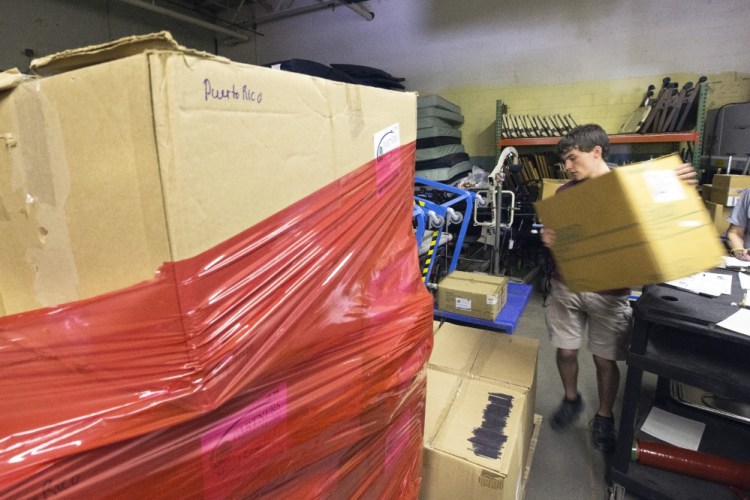Elizabeth McLellan has spent a decade delivering medical supplies that would otherwise be thrown out to people in far-off, impoverished and war-torn places. Bangladesh. Uganda. Syria.
But this week for the first time the recipients of her charity will be American citizens.
On Thursday afternoon, McLellan’s Portland-based group, Partners for World Health, will send more than two dozen pallets of bandages, surgical kits, splints, wheelchairs, walkers and other sorely needed hospital supplies to Puerto Rico, where 3.5 million people are still reeling from the catastrophic damage wrought by Hurricane Maria two weeks ago.
The logistical planning began last week – McLellan had to first find someone in Puerto Rico to receive the supplies.
“A friend knew someone in Connecticut, who knew a doctor in Palm Beach, Florida, who knew someone in Puerto Rico,” McLellan said.
That someone in San Juan was Dr. Jesus Alvelo Santiago, a pediatrician at HIMA San Pablo Bayamón, a hospital on the outskirts of the capital city, who also works at a children’s hospital.
“So many people want to do good and help but they don’t take the time to figure out what’s going to happen on the other end,” McLellan said. Santiago committed in writing to accept the supplies, and wrote that he had connections at the airport to arrange for their pickup.
“That was important to me,” McLellan said. “I don’t want my items to get stuck or to get stolen.”

Elizabeth McLellan, founder of Partners for World Health, searches warehouse shelves Wednesday for boxes of orthopedic supplies to be shipped to Puerto Rico. The Portland-based group is shipping 26 pallets of assorted medical supplies to the U.S. territory to help its hurricane recovery.
The delivery will be shipped by Radford Transportation and Volk Packaging. At Boston’s Logan International Airport, JetBlue will pack the supplies into the belly of a commercial jet flying directly to San Juan. All the transportation costs have been donated by the companies providing them, McLellan said.
She then began looking for airfare for the flight – which is not a typical mode of transport for her group.
McLellan usually packs and ships her supplies in 40-foot containers stacked onto cargo ships. Deliveries to Bangladesh, for instance, can take six weeks. Shipments to Africa take about a month.
McLellan said she depends on organizations that receive the supplies to pay for the transport, customs and port fees, which can be thousands of dollars. If the load shipped to San Juan were to travel by container ship, she said, it would cost $6,500 to $8,500 – far out of her group’s price range.
So McLellan inquired with JetBlue’s corporate social responsibility division. Then, another friend of her organization helped her contact the airline’s CEO, Robin Hayes. McLellan and Hayes swapped emails, and in a matter of days, the airliner agreed to ferry the supplies at no cost.
Partners for World Health gathers unused medical supplies from health care facilities throughout northern New England.
Medical regulations in the United States require doctors and nurses to throw away unused medical equipment and other items simply because they were brought into a patient’s room and therefore designated “used,” even if they are in their unopened, sterile packaging.
Partners for World Health diverts those supplies from landfills and stores them in a network of warehouses in Portland, Bangor, Presque Isle and Vermont before shipping them to places where they are needed. She said she has enough medical supplies in storage to fill more than a dozen 40-foot shipping containers.
Matt Byrne can be contacted at 791-6303 or at:
Send questions/comments to the editors.




Success. Please wait for the page to reload. If the page does not reload within 5 seconds, please refresh the page.
Enter your email and password to access comments.
Hi, to comment on stories you must . This profile is in addition to your subscription and website login.
Already have a commenting profile? .
Invalid username/password.
Please check your email to confirm and complete your registration.
Only subscribers are eligible to post comments. Please subscribe or login first for digital access. Here’s why.
Use the form below to reset your password. When you've submitted your account email, we will send an email with a reset code.